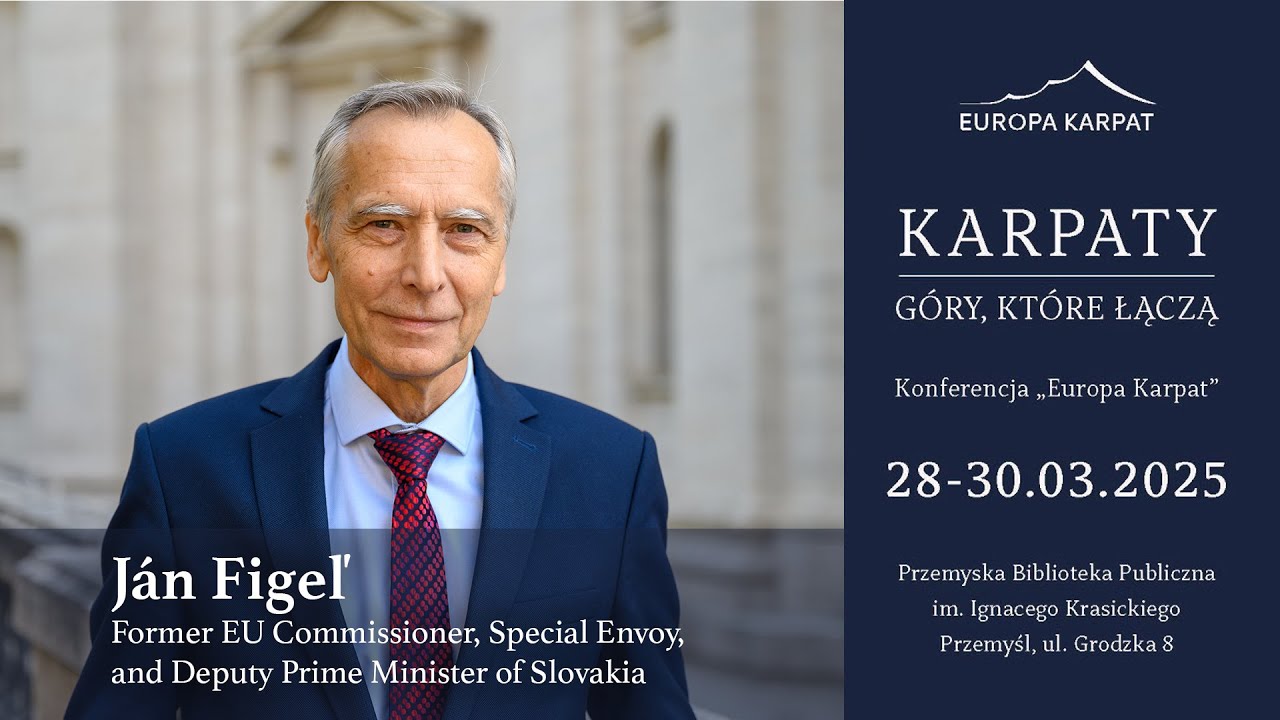Month: March 2025
-

Schuman Plan 2.0 for lasting peace in Europe and for a new West-East Community

Peace in Europe is needed and possible. It is the basis of stability, the goal of security and a precondition for prosperity of countries. On May 9, 1950, the then French Foreign Minister Robert Schuman came up with a plan to create the European Coal and Steel Community as an offer to defeated Germany and other countries. It was a surprise to many, an illusion or an unrealistic plan to others. Communists attacked Schuman as a traitor of France. But since 1950 this peace community grew into a 27-member European Union with a single market, the Schengen system, and a common currency.
By linking the production and trade of commodities essential for the economy and for waging war, the peaceful interest of the perpetual enemies prevailed. Over 75 years, from Kanzler Bismarck through Kaiser Villiam II. to Reichsführer Hitler they had repeatedly exterminated millions of soldiers and civilians.
Before his death, Schuman – Father of Europe reminded that
“we must create Europe not only in the interests of free nations, but also to welcome the nations of the East, who, after being freed from the oppression to which they are subjected, will ask us for acceptance and our moral support”…
The first democratic Chancellor of Germany Konrad Adenauer also thought similarly: “A united Europe was the dream of a few, the desire of many and has become a necessity for all.” However, for several reasons, process of forming a peaceful Europe as a whole remains an unfinished reality. The common European house, often spoken of by R. Schuman and later by Soviet President M. Gorbachev, has not been built. We have a bloody, tragic war here again, which was fully launched by the invasion of Russia in February 2022, but its roots are much deeper. For more than 10 years, there is the so-called Second Cold War. Let us remember that three European wars in the XX Century became global ones – the First, the Second and the Cold. The West won the Cold War, but we did not win peace. Ukraine and the collective West are not winning over Russia in the current war. Immense damage and negative long-term consequences are growing every day. Many commentators, experts and politicians describe it as a so-called proxy war between the USA and the RF carried out on the territory of Ukraine.
The principles of the Schuman Plan have not been exhausted. They are like the roots from which the tree or the human community live. Roots – that is not the past, that is the present and the future. Roots are necessity. Calls are voiced from the capitals of Western Europe to increase armaments, to re-arm Europe, to increase defense spending. Indebted states and weakened economies will not get strengthened by this shift. With a policy of deterrence, we may win or at least draw in this Second Cold War, but we will surely not win peace.
It is necessary to treat the causes, not the symptoms of the conflict. 75 years ago, the peace process was initiated by France and Germany as the long-term enemies. Today it is a challenge for the two military-industrial and biggest nuclear powers in our civilizational space. The USA and Russia have been in confrontation for a decade now. After a significant change in foreign and domestic policy in the USA with inauguration of President D. Trump and the Republican majorities in the Senate and House of the Congress, decisions are quick, often surprising or controversial, but strongly focused on ending the war.
Where I see a path to peace? Transformation of relations begins with dialogue. It has started. Continues with mutually beneficial, win-win cooperation and is directed towards a qualitative change in relations – towards a new community of nations. This long-term vision is not about leaders – Trump or Biden, nor about Putin or Zelensky. Leaders are mortal, they come and go. Peace is in the interests of nations that persist and must shoulder the hardships of war and burden of human losses. Countries and borders use to change in wars. But the most valuable are people. The value of a person goes beyond material dimensions. Therefore, it is important to seek the end of fratricidal devastation by seeking a new quality of relations, focused on the dignity of each person, family, nation and community. The Commander-in-Chief of the Ukrainian Army Oleksandr Syrskyi has parents and a brother living in Moscow. They are Russians. This example speaks painfully.
The dialogue between the USA and Russia should focus on crucial commodities and resources for the conduct of confrontation, conflict and war – on energy, natural resources, information technologies, and protection of intellectual property. The combination of said resources and commodities and related infrastructure into common markets should be offered to other countries as well. Activities of these common markets will boost economic growth and competitiveness of participating countries.
This community will connect Alaska with Kamchatka through Europe and Central Asia. The Northern Hemisphere Community or West-East Community will span over three continents, with Europe in the center. History, close relations and interests speak in favor of a new and decisive action for the global development in the XXI Century. This would create the largest multinational community focused on peaceful cooperation in the world. This would indeed represent a Great Deal for participating nations. It would have a positive impact on the Middle East, Africa and other regions of the world. Such a community would bring unprecedented development to the participating states, economies and regions. It is not against the interests, continuation and better functioning of the EU. Part of such a qualitative change worthy of a more humane XXI Century is also a shared security architecture, which does not exclude a future defense alliance.
This vision of rapprochement and cooperation between the West and the East will take a long and demanding process. It is in line with the image presented by the great Pope St. John Paul II of Europe breathing with both lungs – the Western and the Eastern. Today the West is sick with ethical relativism and new ideologies, and the East is bleeding in fratricidal conflict. This image gives recognition to the Christians spiritual heritage of European continent.
Perhaps such a vision may seem surprising or improbable at this moment, perhaps unacceptable to some. US Secretary of State Dean Acheson wrote about Schuman Plan in his memoirs as “a breathtaking step towards the unification of Western Europe, which he could not even understand at first.” Today, we take the EU for granted…
We need such a breathtaking U-turn in the current situation. Crisis and ongoing tragedy may turn into a historical disaster or into a new beginning for the qualitative change of relations. Within the framework of such a Great Deal, an acceptable solution for peace in Ukraine, for the return of refugees and for the dynamic and successful reconstruction of the destroyed territories will also be found more easily and more quickly.
It is precisely the Central Europe, which have often been in the history the battlefield in wars between powers from the West and from the East. Central European nations remember invasion and occupation, the loss of freedom and independence, but also restoration of freedom democracy, successful transformation and integration into a common Europe. Therefore, Europe should play an active, constructive and creative role for its own better future. The EU needs to become a peace maker and producer, more than a peace fruit and consumer. Creative and constructive efforts for peace must outweigh extensive war efforts. Therefore, we in the West need above all more wisdom and more courage for a reasonable and responsible policy, rather than only more money for ammunition and armaments. We need statesmen and leadership who see the big picture and look into the distance, to the next generations. Concerning future, I recommend neither a cheap optimism, nor a dark pessimism, but first of all we must stay committed. Peace, security and prosperity in our civilizational space is possible and achievable!
-
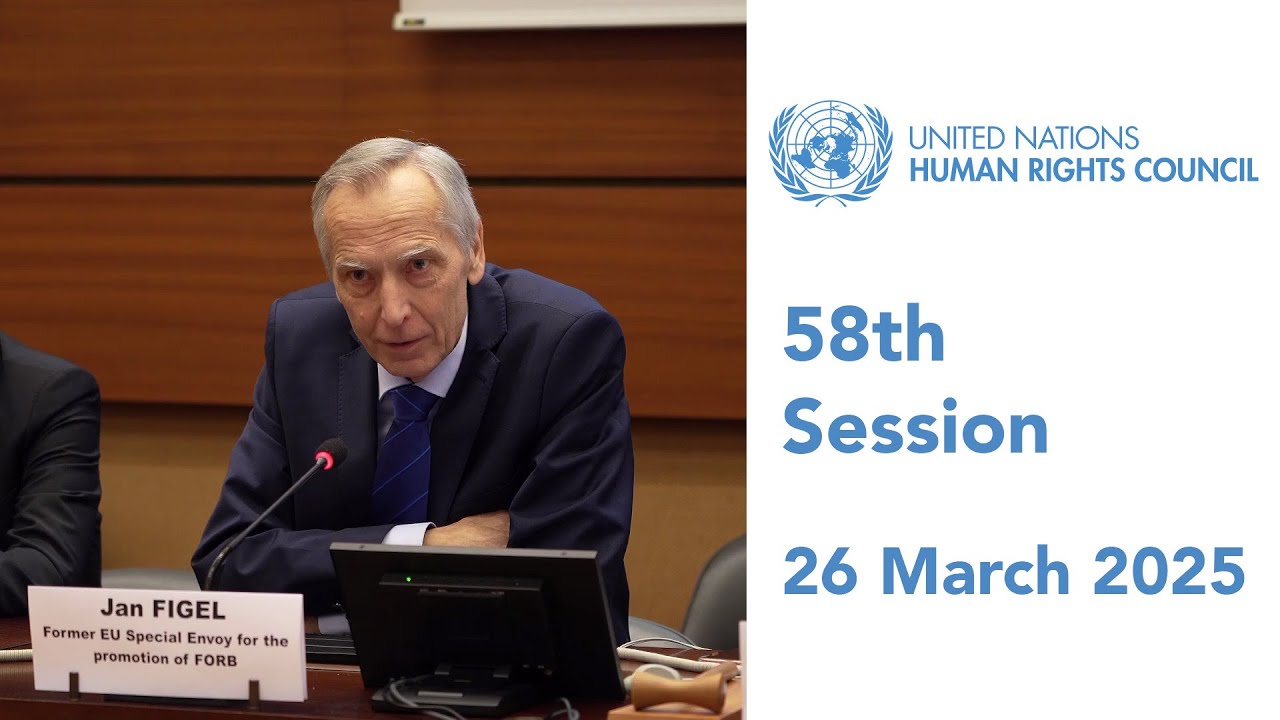
Keynote Address by Ján Figeľ – Religious Freedom and EU-Pakistan Relations
This keynote address by Ján Figeľ, former EU Commissioner and the first EU Special Envoy for the promotion of freedom of religion or belief outside the European Union, was delivered during a side event at the 58th Session of the United Nations Human Rights Council in Geneva on 26 March 2025.
The event, titled “Human Rights in Pakistan: Education Under Siege – Ideology, Intolerance, and the Erosion of Human Rights in Pakistan,” was organised by CAP Liberté de Conscience (France), Human Rights Without Frontiers (HRWF), and Global Human Rights Defence (GHRD).
Figeľ’s intervention focused on the centrality of freedom of religion or belief as a core human right, essential to dignity, peace, and social cohesion. He examined Pakistan as a case study, citing systemic religious persecution, discriminatory education policy, and the politicisation of religious ideology. He also addressed the European Union’s responsibility, given Pakistan’s status as the largest beneficiary of the GSP+ trade arrangement, and called for a principled and consistent EU approach.
The keynote concluded with a call for concrete action, including the review of EU assistance programmes and education support to Pakistan, with a clear commitment to human dignity and universal human rights.
-
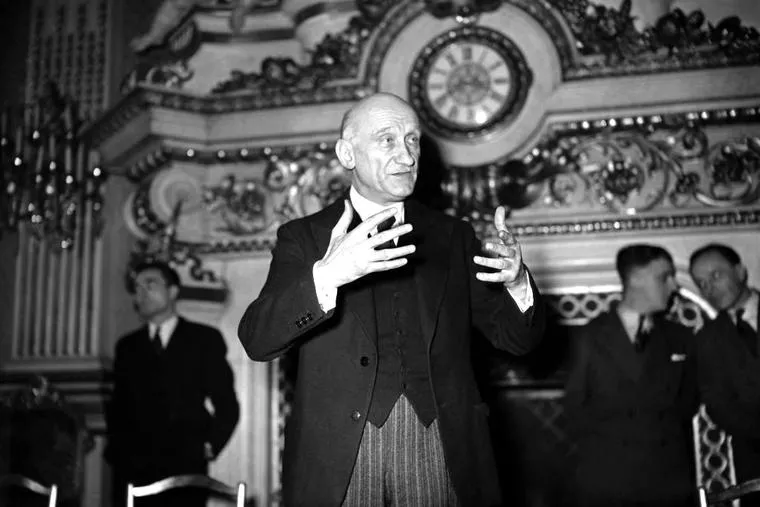
‘Peace Talks’ Must Go Beyond Ending the War in Ukraine
COMMENTARY: Seventy-five years ago, Robert Schuman’s vision for economic partnership among the combatants of World War II led to the creation of the now 27-member European Union. A new West-East economic and trade community could make Schuman’s goal of lasting peace a reality.

French Foreign Minister Robert Schuman delivers a speech during a press conference at The Quai d’Orsay prior to the publication of the north atlantic pact in Paris on March 18, 1949. (photo: News Photo / Getty Images) March 25, 2025
Peace in Europe is needed and possible. But as the Cold War of the last century demonstrated, there is a difference between an end to open hostilities and real peace. The best way to achieve the latter is through multilateral agreements that prioritize economic and trade cooperation and the common good.
This was the vision that Robert Schuman had in the aftermath of World War II. Today we recognize Schuman as a modern-day “Father of Europe.” But on May 9, 1950, when he was the French foreign minister, his proposal to invite Germany and other countries to form a cooperative European Coal and Steel Community — shrewdly creating a common market for the very commodities necessary for waging war — was dismissed by many as illusory. Communists attacked Schuman as a traitor of France.
Declared “Venerable” by Pope Francis in 2021, Schuman persevered, as great statesmen do. And over the next 75 years, his peace community grew into a 27-member European Union with a single market — the Schengen system — and a common currency.
Before his death in 1963, Schuman emphasized that “we must create Europe not only in the interests of free nations, but also to welcome the nations of the East, who, after being freed from the oppression to which they are subjected, will ask us for acceptance and our moral support.” The first democratic chancellor of Germany, Konrad Adenauer, thought similarly. “A united Europe,” he observed, “was the dream of a few, the desire of many and has become a necessity for all.”
However, for several reasons, the formation of a peaceful Europe remains an unfinished project. The now-three-year-old war in Ukraine testifies to this tragic reality.
The bloodshed must stop. Yet the nations of Western Europe are making a critical mistake if they applaud those who say the solution is to boost defense spending and rearm themselves. Indebted states and weakened economies will not be strengthened by this shift. With a policy of deterrence, we may win or at least achieve a draw in this Second Cold War, but we will surely not win peace.
The principles of the Schuman Plan have not been exhausted. They are like the roots from which the tree of the human community draw life.
Transformation of relations begins with dialogue, which is now underway on the initiative of the new Trump administration in the United States. It is paramount, though, that these efforts be directed toward the creation of a new community of nations.
In that vein, the dialogue between the United States and Russia should focus on establishing common markets, open to other countries and designed for the participants’ mutual benefit, for the crucial commodities needed to wage war. This would encompass not only natural resources and energy but information technologies and the protection of intellectual property.
Such a Northern Hemisphere Community or West-East Community would connect Alaska with Kamchatka through Europe and Central Asia, spanning three continents — with Europe at its center. It would bring unprecedented development to the participating states, economies and regions.
This kind of framework need not supplant or rival the EU. But part of such a qualitative change, worthy of a more humane 21st century, is the need for a shared security architecture, which does not exclude a future defense alliance.
This long-term vision is not about leaders, who come and go. Peace is in the interests of nations that persist and must shoulder the hardships of war and the burden of human losses. The value of a person goes beyond material dimensions. Therefore, it is important to seek the end of fratricidal devastation by seeking a new quality of relations, focused on the dignity of each person, family, nation and community. The commander-in-chief of the Ukrainian army, Gen. Oleksandr Syrskyi, has parents and a brother living in Moscow. They are Russians. This example speaks painfully.
This vision of rapprochement and cooperation between the West and the East will require a long and demanding process. It is in line with the image presented by the great Pope St. John Paul II of Europe breathing with both lungs — the West and the East. Today the West is sick with ethical relativism and new ideologies, and the East is bleeding in fratricidal conflict.
Perhaps such a vision may seem surprising or improbable at this moment, perhaps unacceptable to some. U.S. Secretary of State Dean Acheson wrote about the Schuman Plan in his memoirs as “a breathtaking step towards the unification of Western Europe, which he could not even understand at first.”Today we take the EU for granted.
We need such a breathtaking U-turn in the current situation. Crisis and ongoing tragedy of war may turn into a historical disaster or into a new beginning for the qualitative change of relations. Within the framework of such a Great Deal, an acceptable solution for peace in Ukraine, for the return of refugees and for the dynamic and successful reconstruction of the destroyed territories will also be found more easily and more quickly.
We in the West need above all more wisdom and more courage for a reasonable and responsible policy, rather than only more money for ammunition and armaments. We need statesmen and leaders who see the big picture and look into the distance to future generations.
Concerning the future, I recommend neither a cheap optimism, nor a dark pessimism, but first of all we must stay committed. Peace, security and prosperity in our civilizational space is possible and achievable!
Original link: https://www.ncregister.com/commentaries/schuman-s-goal-of-lasting-peace-ukraine
-
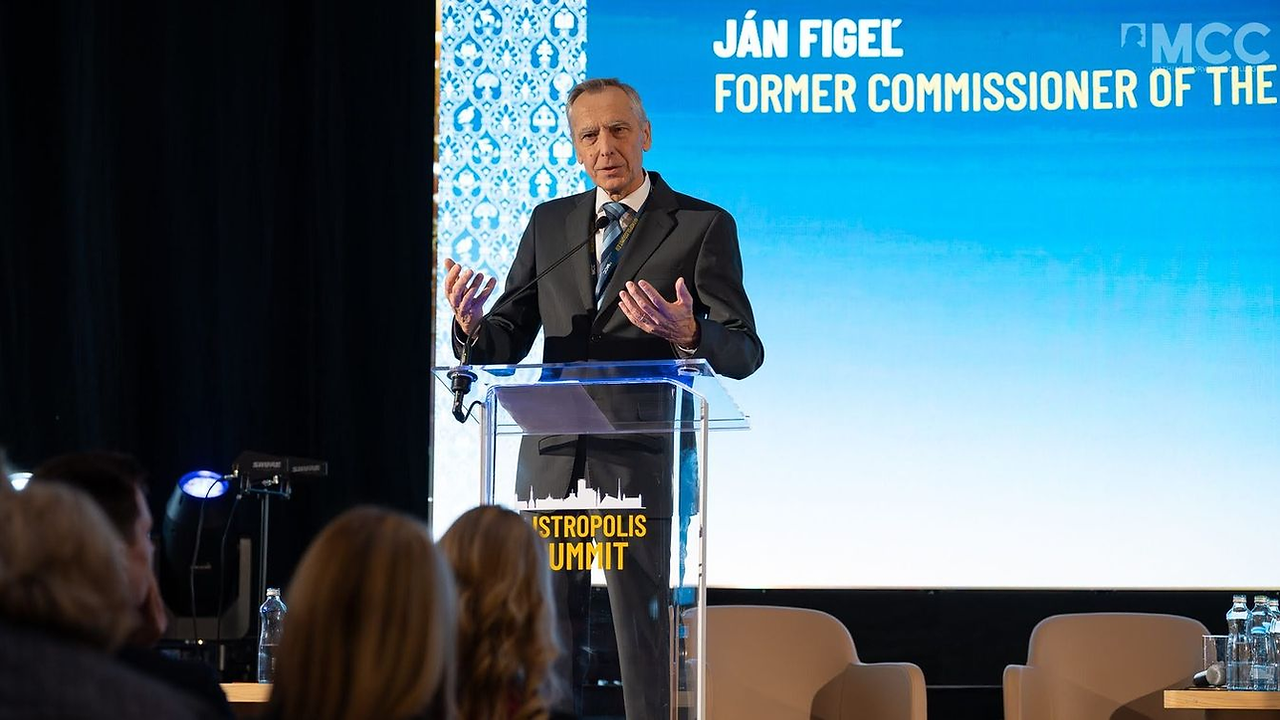
„Több mint tíz éve zajlik a második hidegháború”– mondta Ján Figeľ az MCC konferenciáján
Ján Figeľ Szlovákia korábbi Európai Uniós biztosa Pozsonyban az MCC által szervezett Istropolis Summiton arról beszélt, hogy az „az európai béke nem csak szükséges, hanem lehetséges is.”

Az írás Ján Figeľ (Szlovákia korábbi Európai Uniós biztosa) beszédének leirata. Elhangzott angolul március 7-én, a Mathias Corvinus Collegium által szervezett Istropolis Summit konferencián, Pozsonyban.
***
Az európai béke nem csak szükséges! Lehetséges is! Ez adja a kontinens stabilitásának és biztonságának alapját, a biztonságpolitika célját, ez jólétünk záloga! A francia külügyminiszter, Robert Schuman 1950. május 9-én állt elő a szénre és acélra épülő új európai együttműködés tervével, felkínálva annak lehetőségét a legyőzött Németország számára is. Schuman akkoriban sokakat meglepett, néhányan egyenesen illuzórikusnak tartották az elképzelést. A kommunisták egyenesen Franciaország árulójának kiálltották ki a minisztert.
A háborúhoz elengedhetetlen nyersanyagok előállítására és kereskedelmére alapuló új béketerv összecsengett a két régi ellenség érdekeivel, akik az azt megelőző 75 évben — Bismarck kancellártól II. Vilmoson át Hitlerig – milliónyi katonát és civilt gyilkoltak meg háborúik során. Az utóbbi 75 évben ez a kezdeti együttműködés egy 27 tagú szövetségé nőtte ki magát, egységes piaccal, felszámolt belső határokkal és közös valutával.
Halála előtt Schuman figyelmeztetett, az egységes Európát nemcsak a szabad nemzetek érdekében kell megteremtenünk, hanem azért is, hogy „integráljuk a keleti nemzeteket, amelyek az elnyomás alól felszabadulva kérik majd a befogadást és erkölcsi támogatásunkat.“
Konrad Adenauer is valami hasonlót fogalmazott meg, amikor arról beszélt, az egységes Európa „néhányak álma, sokak vágya és mindannyiunk elemi érdeke“.
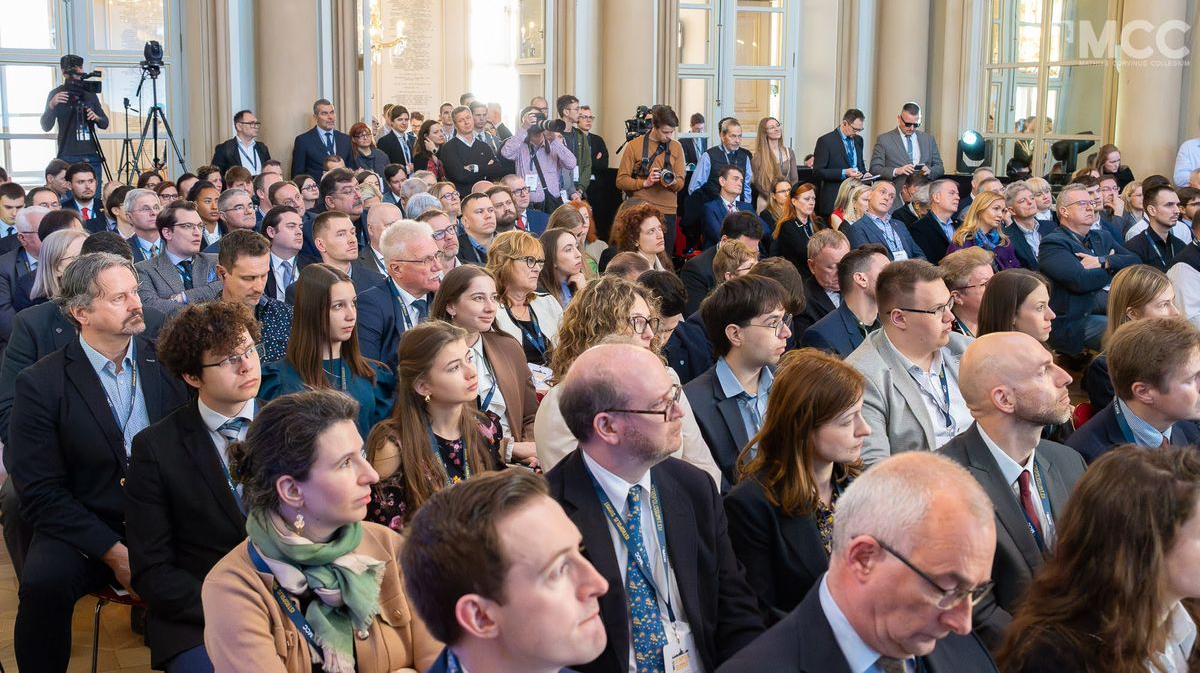
Fotó: Vince Rozsár/MCC Számtalan oknál fogva az európai egység kialakítása ma sem befejezett projekt. A Schuman és Gorbacsov által sokat emlegetett közös európai ház mindmáig nem épült meg. Mióta Oroszország 2022 februárjában megtámadta Ukrajnát, újra véres háború dúlja fel a kontinenst. A gyökerek jóval mélyebbre nyúlnak az elmúlt három évnél. Több mint tíz éve zajlik a második hidegháború. Emlékezhetünk, a XX. században három európai háborúból lett világháború: a két nevezett mellett az Európából induló első hidegháború is hamar globálissá vált.
A Nyugat ugyan megnyerte ezeket a háborúkat, de a békét sosem nyerte el. Ezt az aktuális háborút sem nyerheti meg.
Egyre csak gyűlik a tragédia, miközben zajlik a mind több szakértő által az Egyesült Államok és Oroszország között zajló proxiháborúnak tartott véres orosz-ukrán konfliktus.
Schuman terve ennek ellenére sem vesztette jelentőségét. A néhai francia külügyminiszter által lefektetett elvek olyanok, mint a fa gyökerei. Ezek nem a múltba nyúlnak, hanem lehorgonyoznak minket a jelenben és stabilitást nyújtanak a jövőben. Európa fővárosaiból folyton azt halljuk, fegyverkezésre van szükség, fokozni kell a védelmi kiadásokat. Hogy lesz ebből kiút az eladósodott, egyre gyengébb gazdasági teljesítménnyel bíró államoknak? Az elrettentés politikájával talán megnyerjük, vagy legalább döntetlenre hozzuk a második hidegháborút, de béke biztosan nem lesz belőle, holott épp ez adná meg az oly‘ régóta várt állandóságot és stabilitást, biztonságpolitikánk célját és fejlődésünk zálogát.
A tüneti kezelés nem elég, az okokat kell feltárnunk! Ha 75 évvel ezelőtt a két korábbi ellenség, Franciaország és Németország kezdeményezték a békefolyamatot, úgy most a globális erőtér két atomnagyhatalmának kell azt kezdeményeznie. Oroszország és az Egyesült Államok évtizedek óta áll egymással szemben. Donald Trump megválasztásával és a törvényhozás két házának republikánus többségével felgyorsult az amerikai döntéshozatal. Néha ugyan meglepő és hirtelen, de legalább a háború befejezésére koncentrál.
Merre halad hát a békéhez vezető út? Minden a párbeszéddel kezdődik, kölcsönösen előnyös együttműködéssel folytatódik, és egy minőségbeli változás felé tart.
Az európai nemzetek új közössége felé. Ennek semmi köze Trumphoz, Bidenhez, Putyinhoz vagy akár Zelenszkijhez. A vezetők halandó emberek, jönnek és mennek, ki később, ki előbb, de biztosan!
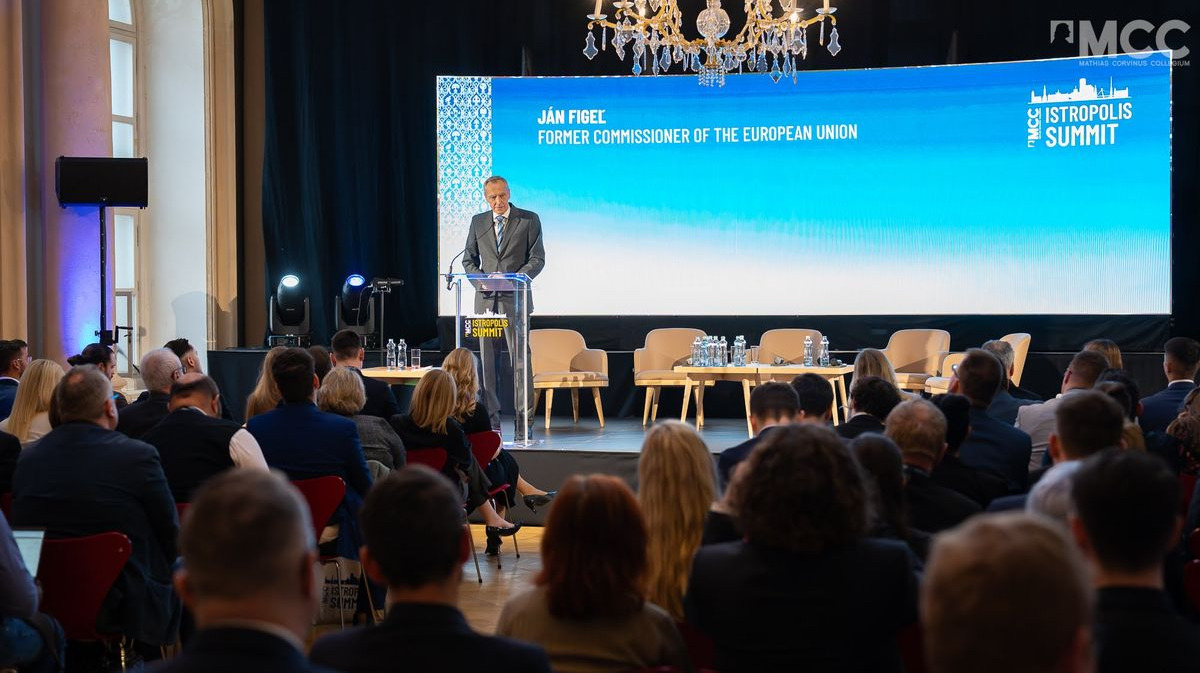
Kép: Rozsár Vince/MCC A béke a nemzetek érdeke, amelyek kitartanak, megmaradnak. Túlélnek háborúkat és szörnyű veszteségeket. A határok megváltozhatnak, de az emberélet nem fordítható le számokra és anyagiakra. Ezért kell megállítanunk a testvérháborút és megtalálnunk az együttműködés új minőségét. Egy minőséget, amely az ember, a család, a nemzet és a társadalom inherens értékén alapul. Az ukrán erők főparancsnokának, Olekszandr Szirszkijnek a szülei és bátyja mind a mai napig Moszkvában élnek. Ez a tény többet mond ezer szónál.
Az Egyesült Államok és Oroszország közötti leendő párbeszédnek a konfliktus és háború szempontjából meghatározó erőforrásokra kell összpontosítania – az energiára, a természeti erőforrásokra, az információs technológiákra és a szellemi tulajdon védelmére. Az említett források, árucikkek és kulcsfontosságú infrastruktúrák közös piacokba való integrálását más országoknak is fel kell ajánlani. Ezzel összekötjük Alaszkát Kamcsatkán keresztül Európával és Közép-Ázsiával. A történelmi tanulságok és közös érdekeink mind egy új, a világ fejlődésére döntő hatással bíró északi féltekei közösség létrejötte mellett szólnak. Olyan közösség létrejötte mellett, amely páratlan potenciállal bír egy minden eddiginél gyümölcsözőbb együttműködés biztosításához. Az Európai Unió számára is óriási lehetőségeket hozhat.
Egy ilyen modern, XXI. századi, minőségbeli változásnak a közös biztonságpolitika is része kell, hogy legyen, amely nem zárja ki egy védelmi szövetség létrehozását sem.
Kelet és Nyugat közeledésének, majd együttműködésének folyamata igen hosszú, mindazonáltal megegyezik a nagy pápa, II. János Pál álmával is, a pápáéval, aki „tüdejének mindkét felével, egy keletivel és egy nyugatival” egyszerre lélegzett. Ez egy keresztény etika és lelkiség által alátámasztott gondolat. Ma a nyugati féltekét új ideológiák és erkölcsi relativizmus fertőzik, miközben a keleti rész kivérzik egy testvérháborúban. Persze, lehet, hogy a fenti elképzelés ebben a pillanatban nehezen megérthető, kevéssé valószínű, sőt, néhányaknak egyenesen elfogadhatatlan.
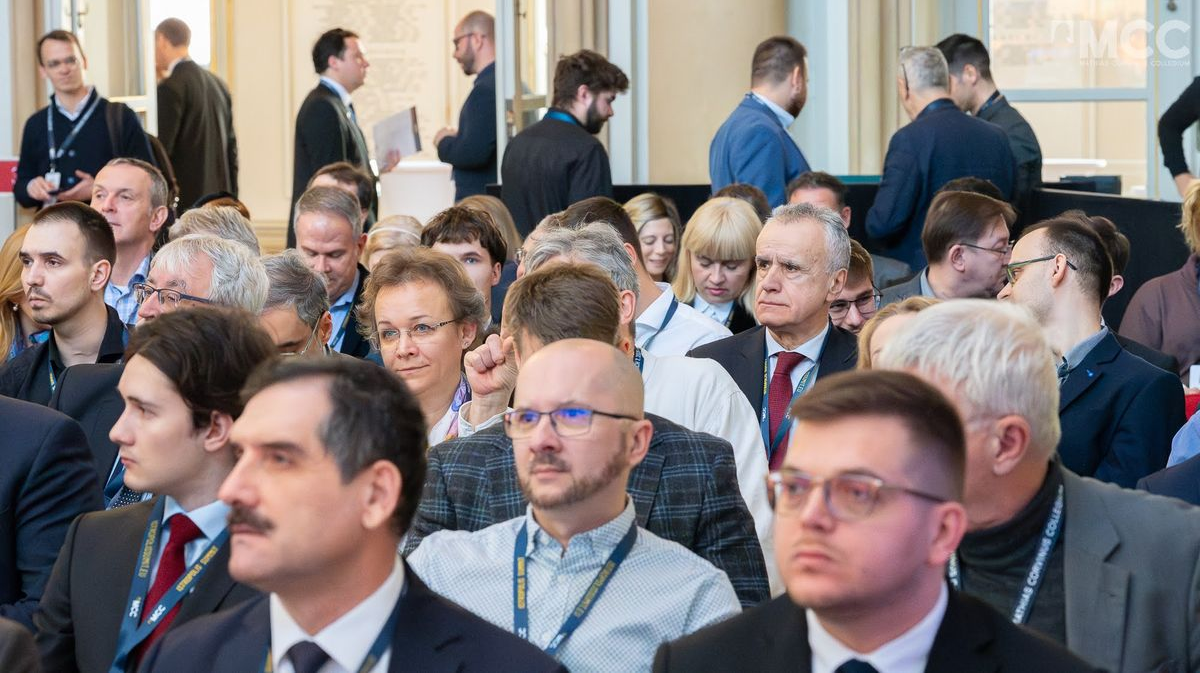
Kép: Rozsár Vince/MCC Schuman amerikai kollégájával, az akkori külügyminiszterrel Dean Acheson-nal is egyeztetett az elképzeléséről. Acheson azt írja emlékirataiban: a Schuman-terv egy „lélegzetelállító lépés volt Nyugat-Európa egyesítse felé”, amelyet az első pillanatban „képtelen volt megérteni”. Ma ezt az egységet magától értetődőnek tekintjük… A fent bemutatott geopolitikai és gazdasági szempontból is konstruktív javaslat fényében ugyanakkor könnyebben és gyorsabban találhatnánk megoldást az orosz-ukrán háború legfontosabb következményeire: a háború elől hazájukat elhagyni kényszerülő százezrek sorsára és a porig rombolt települések újjáépítésére.
A nagyhatalmak által sokszor csak csatatérként használt, az inváziókkal és megszállásokkal terhelt, történelmük során nem egyszer függetlenségüket vesztett közép-európai országoknak aktív és alkotó szerepet kell kapniuk ebben a folyamatban. Hiszen éppen ők azok, akiknek a demokratikus átalakulás sikeres véghezvitelében és az egységes Európa létrehozásában is van tapasztalatuk.
A békéért folytatott erőfeszítésnek végre meg kell haladnia a háborús erőfeszítéseket.
A Nyugatnak éppen ezért több józan észre és több bátorsága van szüksége, nem pedig több pénzre, fegyverre és töltényre. Generációs távlatokban gondolkodó, a nagy képet szem előtt tartó vezetőkre!
Nem olcsó optimizmus vagy sötét pesszimizmus kell, hanem szilárd elhatározás, hogy a béke, a biztonság és a jólét nem csak lehetséges, de el is érhető!
Ján Figeľ a Szlovák Köztársaság volt miniszterelnök-helyettese, az EU korábbi biztosa. Az Európai Unión kívüli vallás- és hitvallásszabadságért felelős korábbi különmegbízott. Szlovákia uniós csatlakozási tárgyalásainak vezetője, az ország NATO-tagságra való felkészülésének egyik koordinátora. Az EIT alapítója, valamint a Clementy Alapítvány Tudományos Bizottságának elnöke, amely a Schuman-örökség tanulmányozásával foglalkozik. (www.janfigel.sk)
fordította: Pomichal Krisztián
-

Schuman Declaration 2.0: A great deal for peace, security and prosperity

Peace through energy prosperity and security between European Union and Russia illustration by Alexander Hunter/The Washington Times Peace in Europe is needed and possible. It is the basis of stability, the goal of security and a precondition for prosperity.
On May 9, 1950, French Foreign Minister Robert Schuman devised a plan to create the European Coal and Steel Community as an offer to defeated Germany and other countries. It was a surprise to many, an illusion to others. Communists attacked Schuman as a traitor to France. The peaceful interests of the perpetual enemies prevailed by linking the production and trade of commodities essential for the economy and for waging war. They had repeatedly exterminated millions of soldiers and civilians over three-quarters of a century. During the next 75 years, this peace community grew into a 27-member European Union with a single market and a common currency.
The process of forming a peaceful Europe remained unfinished. The common European house, often mentioned by Schuman and later by Soviet President Mikhail Gorbachev, has not been built. We have a bloody, tragic war in Europe again, launched by the invasion of Russia into Ukraine in February 2022.
Let us remember that three European conflicts in the 20th century became global: World War I, World War II and the Cold War. The West won the Cold War but did not win peace. Ukraine and the collective West are not winning over Russia. Immense damage and long-term consequences are growing daily. Many describe it as a proxy war between the U.S. and the Russian Federation carried out in Ukraine. For more than 10 years, there has been a second cold war.
Calls are voiced from the capitals of Western Europe to increase armaments, re-arm Europe and increase defense spending. This shift will not strengthen indebted states and weakened economies. With a deterrence policy, we may win or draw in this second cold war, but we will surely not win peace.
The principles of the Schuman Declaration have not been exhausted. Seventy-five years ago, France and Germany initiated the peace vision in Europe. Today, it is a challenge for the two biggest nuclear powers in our civilizational space. With President Trump’s inauguration and Republican majorities in Congress, U.S. decisions are quick, some surprising. Concerning Ukraine, they are strongly focused on ending the war. Russia signals its interest in dialogue and new relations with the U.S.
Peace is in the interests of nations that persist and must shoulder the hardships of war and the burden of human losses. Countries and borders change in wars, but the most valuable are people. The value of a person goes beyond material dimensions. Therefore, it is important to seek the end of devastation by seeking a new quality of relations, respecting the dignity of each person, family, nation and community. This is not about leaders — Messrs. Trump, former President Joseph R. Biden, Russian leader Vladimir Putin or Ukrainian President Volodymyr Zelenskyy. Leaders are mortal; they come and go. But leaders can make a great deal happen for their people.
The dialogue between the U.S. and Russia has started. It should focus on key commodities and resources for the conduct of conflict and war: energy, natural resources, information technologies and protection of intellectual property. Including said resources and commodities and related infrastructure into common markets should also be open to other countries. The founding of these common markets will boost the economic growth and competitiveness of participating countries.
New markets will connect Alaska with the Kamchatka Peninsula through Europe and Central Asia. The Northern Hemisphere community will span three continents, with Europe in the center. This will create the largest multinational potential focused on peaceful cooperation and represent a great deal for participating nations. It will have a positive impact on other world regions. Such a community will bring unprecedented development to the participating states and economies. It is not against the interests, continuation and better functioning of the European Union. The logical part of such a qualitative change is a shared security architecture, which does not exclude a defense alliance. History and objective interests favor a new action for a more humane 21st century.
Rapprochement and cooperation between the West and the East will take a lot of effort and hard work. This aligns with St. John Paul II’s image of Europe breathing with both lungs: the Western and the Eastern. Today, the West is weakened by new ideologies and ethical relativism, and the East is bleeding in fratricidal conflict.
The crisis may turn into a historical disaster or into a positive way out, a new beginning. Within the framework of a great deal, an acceptable solution for peace in Ukraine, for the return of refugees, and for dynamic and successful reconstruction of the destroyed territories will be found more easily and quickly.
Creative and constructive peace efforts must outweigh extensive warmongering. Therefore, the West needs, above all, more wisdom and courage for a reasonable and responsible policy rather than more money for ammunition and armaments. We need statesmen and leaders who see the big picture and look into the distance to the next generations. Peace, security and prosperity in our civilizational space are possible and achievable.
• Jan Figel is a former European Union commissioner, special envoy and deputy prime minister of Slovakia. He currently serves as the Chair of the Clementy Foundation’s Scientific Committee.
-
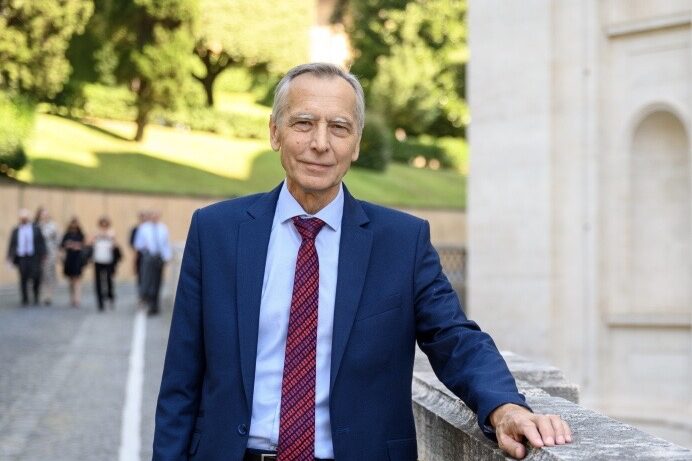
Schumanov plán 2.0 pre trvalý mier v Európe

Mier v Európe je potrebný a možný. Je základom stability, cieľom bezpečnosti a predpokladom prosperity. 9. mája 1950 vtedajší francúzsky minister zahraničných vecí Robert Schuman prišiel s plánom na vytvorenie Európskeho spoločenstva uhlia a ocele ako s ponukou pre porazené Nemecko a ďalšie krajiny. Bolo to prekvapenie pre mnohých. Niektorí to komentovali ako ilúziu či nereálny plán. Komunisti za to Schumana atakovali ako zradcu Francúzska.
Prepojením výroby a obchodu komodít nevyhnutných pre ekonomiku a pre vedenie vojny sa presadil mierový záujem odvekých nepriateľov, ktorí si za trištvrte storočia od kancelára Bismarcka cez cisára Villiama II. až po Ríšskeho vodcu Hitlera opakovane vyhubili milióny vojakov a civilov. Za ďalších 75 rokov prerástlo toto spoločenstvo do 27- člennej Európskej únie s jednotným trhom, Schengenským systémom, spoločnou menou.
Pred smrťou Schuman ako Otec Európy pripomínal, že „musíme vytvoriť Európu nielen v záujme slobodných národov, ale aj pre uvítanie národov z Východu, ktoré po uvoľnení z útlaku, ktorému sú vystavené, nás požiadajú o prijatie a o našu morálnu podporu“… Podobne zmýšľal aj K. Adenauer: „Zjednotená Európa bola snom niekoľkých, túžbou mnohých a stala sa nevyhnutnosťou pre všetkých.“
Realitou však z viacerých príčin zostáva nedokončený proces vytvorenia mierovej Európy ako celku. Spoločný Európsky dom, o ktorom často hovoril R. Schuman a neskoršie M. Gorbačov, nebol dobudovaný. Znovu, už tri roky tu máme krvavú, tragickú vojnu, ktorú naplno zahájil vojenský útok Ruska na Ukrajinu vo februári 2022, ale korene má oveľa hlbšie. Ich vyjadrením je už vyše 10 rokov tzv. Druhá studená vojna. Pamätajme, že tri európske vojny v 20. storočí sa stali svetovými – Prvá, Druhá a Studená. Západ vyhral Studenú vojnu, ale nevyhral mier. Súčasnú vojnu v susedstve strednej Európy Ukrajina a Západ nevyhrávajú. Nesmierne škody a negatívne dôsledky narastajú každý deň. Mnohí komentátori a politici ju označujú za tzv. zástupnú vojnu medzi USA a RF, realizovanú na území Ukrajiny.
Princípy Schumanovho plánu sa nevyčerpali. Sú ako korene, z ktorých žije strom i ľudské spoločenstvo. Korene – to nie je minulosť, to je súčasnosť a budúcnosť. Korene sú nevyhnutnosť. Z hlavných miest západnej Európy sa opakujú výzvy na zvýšenie zbrojenia, na rozsiahlejšie financovanie obrany. Zadlžené štáty a oslabené ekonomiky sa týmto neposilnia. Politikou zastrašovania možno vyhráme alebo aspoň remizujeme v Druhej studenej vojne, ale mier nezískame. A opakujem – mier je základom stability, cieľom bezpečnosti a predpokladom prosperity.
Je nevyhnutné liečiť príčiny, nie symptómy konfliktu. Ak pred 75 rokmi mierový proces iniciovali pôvodní nepriatelia Francúzsko a Nemecko, dnes je to výzva pre dve vojensko-priemyselné a jadrové mocnosti v našom civilizačnom priestore. Rusko a USA sú už desaťročie v konfrontácii. Po výraznej zmene zahraničnej i vnútornej politiky v USA nástupom D. Trumpa a republikánskej väčšiny v Senáte i Snemovni Kongresu sú americké rozhodnutia rýchle, často prekvapivé, ale výrazne zamerané na skončenie vojny.
Kde vidím teda cestu k mieru? Zmena vzťahov začína dialógom, pokračuje vzájomne výhodnou spoluprácou a smeruje ku kvalitatívnej zmene – k novému spoločenstvu národov. Tento dlhodobý zámer nie je o Trumpovi či Bidenovi, ani o Putinovi či Zelenskom. Lídri sú smrteľní, prichádzajú a odchádzajú, skôr alebo neskôr, ale istotne. Mier je v záujme národov, ktoré pretrvávajú a prežívajú aj vojnové útrapy a ľudské straty. Vo vojnách sa menia hranice. Ale najcennejší sú ľudia. Hodnota človeka presahuje materiálne rozmery. Preto je dôležité hľadať ukončenie bratovražedných operácií hľadaním novej kvality vzťahov, zameraných na dôstojnosť každej osoby, rodiny, národa a spoločenstva. Hlavný veliteľ Ukrajinskej armády Oleksander Syrskij má rodičov a brata žijúcich v Moskve. Sú Rusmi. Tento príklad hovorí boľavou rečou.
Dialóg medzi USA a Ruskom by mal byť zameraný na rozhodujúce komodity a zdroje pre vedenie konfliktu a vojny – na energie, prírodné zdroje, informačné technológie, a ochranu duševného vlastníctva. Spojenie uvedených zdrojov a komodít a kľúčovej infraštruktúry do spoločných trhov by malo byť ponúknuté aj ďalším krajinám. Prepojí sa tým Aljaška s Kamčatkou cez Európu a cez strednú Áziu. História, blízke vzťahy a záujmy hovoria v prospech nového a pre svetový vývoj rozhodujúceho Spoločenstva severnej hemisféry. Vznikol by tak najväčší medzinárodný potenciál zameraný na mierovú spoluprácu. Bude to mať pozitívny vplyv na Blízky východ, Afriku a ďalšie regióny sveta. Takéto spoločenstvo prinesie nebývalý rozvoj zúčastnených štátov a ekonomík. Nie je to proti záujmom, pokračovaniu a lepšiemu fungovaniu EÚ. Súčasťou takejto kvalitatívnej zmeny hodnej ľudskejšieho 21. storočia je aj zdieľaná bezpečnostná architektúra, ktorá nevylučuje budúcu obrannú alianciu.
Táto vízia zblíženia a spolupráce Západu a Východu bude dlhým procesom. Je v zhode s obrazom veľkého pápeža sv. Jána Pavla II. o Európe, ktorá dýcha oboma časťami pľúc – západnou i východnou. Dnes je západná oslabená etickým relativizmom a novými ideológiami a východná krváca bratovražedným konfliktom.
Možno je takáto vízia v tejto chvíli ťažko uveriteľná, málo pravdepodobná, možno pre niektorých neprijateľná. Americký minister zahraničia Dean Acheson, s ktorým Schuman konzultoval svoj mierový plán deň pred jeho zverejnením, vo svojich pamätiach o tom napísal ako „o dych vyrážajúcom kroku k zjednoteniu západnej Európy, ktorý v prvej chvíli ani nedokázal pochopiť“. Dnes to už toto zjednotenie považujeme za samozrejmosť…
V rámci takéhoto vývoja sa ľahšie a rýchlejšie nájde aj prijateľné riešenie pre mier na Ukrajine, pre návrat utečencov a pre dynamickú a úspešnú obnovu zničených území. Práve stredoeurópske krajiny, ktoré často boli bojovým poľom vo vojnách medzi mocnosťami, ktoré majú v pamäti inváziu a okupáciu, stratu slobody a nezávislosti, ale aj úspešnú demokratickú transformáciu a formovanie spoločnej Európy, by mali pritom zohrať aktívnu, konštruktívnu a tvorivú úlohu.
Tvorivé a konštruktívne úsilie o mier musí prevýšiť doterajšie vojnové úsilie. Preto Západ potrebuje predovšetkým viac múdrosti a viac odvahy pre rozumnú a zodpovednú politiku, než len viac peňazí na muníciu a výzbroj. Potrebujeme štátnikov, ktorí vidia veľký obraz a vidia do diaľky, na nasledujúce generácie. Čo sa týka budúcnosti, neodporúčam ani lacný optimizmus, ani temný pesimizmus, ale v prvom rade pevné odhodlanie. Mier, bezpečnosť a prosperita v našom civilizačnom priestore sú možné a sú dosiahnuteľné!
Ján Figeľ
7. 3. 2025, ISTROPOLIS SUMMIT v Bratislave
Organizátor: MCC (Mathiac Corvinus Collegium) v partnerstve s Nadáciou NTPT a Spoločenstvom SLH
Ján Figeľ je bývalý podpredseda vlády SR, viedol prístupové rokovania Slovenska do Európskej únie a prípravu na členstvo v NATO, vykonával mandáty komisára EÚ, bol Osobitným vyslancom pre slobodu náboženského vyznania alebo viery mimo EÚ, je zakladateľom EIT a predsedom Vedeckého výboru Nadácie Clementy pre štúdium Schumanovho dedičstva (www.janfigel.sk)
https://www.teraz.sk/publicistika/analyza-j-figela-schumanov-plan-20/862500-clanok.html
https://sita.sk/schumanov-plan-2-0-pre-trvaly-mier-v-europe-komentar
https://www.postoj.sk/171887/schumanov-plan-20-pre-mier-veurope
https://standard.sk/908581/schumanov-plan-2-0-pre-mier-v-europe-nove-spolocenstvo-zapadu-a-vychodu

